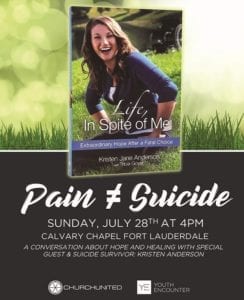
Whether it’s the Fort Lauderdale Airport shooting, hurricanes or the more recent tragedy at Marjory Stoneman Douglas High School, our community has been through a lot of pain. However, pain does not equal suicide.
Overwhelmed by wave after wave of emotional trauma, Kristen Anderson, author of Life in Spite of Me, Extraordinary Hope After a Fatal Choice, no longer wanted to live. One January night, determined to end her pain once and for all, the seventeen-year-old lay across train tracks not far from her home and waited to die.
Surviving her suicide attempt but losing her legs launched Kristen into an even deeper battle with depression and suicidal thoughts, as well as unrelenting physical pain — all from the seat of a wheelchair. But in the midst of her darkest days, Kristen discovered the way to real life and a purpose for living.
Revealing light
As a therapist, the first thing I want to establish when meeting a new client is that they are safe with themselves and others. I have to respect the answer a client gives me about their safety, as I cannot search their internet browsing history or read their mind. There are some rather significant statistics that show that clients sometimes lie to their therapists, and I am acutely aware that this could be one of the areas a client lies about. It’s a client’s right to hold back information or lie. However, I desperately wish they wouldn’t because I’m here to help.
I believe life is precious and worth fighting for – and this includes our own. For someone to get to the point of thinking that ending their life is the best or only option – I am certain darkness is surrounding them. If we are surrounded by darkness, we need light to see and think clearly. In darkness, we are more likely to believe lies (our own and others’). Imagine this – in a dark room, if someone were to tell you there is no way out of the room, you’ll be in here forever. This could feel like a real possibility. After all, it’s dark and you cannot see a way out. Once the light is turned on, however, you can see the door, the window; you can see there is a way out.
Knowing darkness (like depression, grief, and loneliness) can be a scary and confusing place, I want to help someone see light as quickly as possible. Even if it’s a little light – like the small flame of a lighter. What a relief it is to realize there’s a little light available when you’ve been in darkness. What does that little light do? It provides hope – a way out can be seen.
 Acknowledging pain
Acknowledging pain
We need to acknowledge there can be pain in this life where ending life does feel like the best or only option. In the Bible, Job describes wanting to die from experiencing this kind of pain: “Oh that I might have my request, and that God would fulfill my hope, that it would please God to crush me, that he would let loose his hand and cut me off!” (Job 6:8-9). After all of the loss that Job experienced (his children, livestock and his very health), it seems almost natural for Job to want out of this life, out of the pain.
When we fail to acknowledge or empathize with someone experiencing this depth of pain (regardless of the cause), we deny their humanity and our own. Just because you haven’t felt this depth of darkness and isolation in your heart doesn’t mean you won’t in the future. Telling someone they shouldn’t feel the way they do leaves them to suffer alone in the darkness. We need others to know we’re not alone.
But here’s the truth that hides in darkness – the darkness, in whatever form, won’t always be. Sometimes we don’t know how or when it will end, and that can be the scariest part. But when thinking about the topic of suicide, I think of two of God’s promises (there are so many more): it won’t always be night and life and death are in God’s hands. See the hope here in Psalm 30:5: “Weeping may tarry for the night, but joy comes with the morning.” The sun will rise, there will be light, there is hope. In Psalm 139:16, the Psalmist talks about God’s specific plan for each person from before conception all the way to their death – neither times of which we know for ourselves: “Your eyes saw my unformed substance; in your book were written, every one of them, the days that were formed for me, when as yet there was none of them.”
Finding hope
If you are feeling the way Job described, you are likely in darkness. You need just a small light to make your way out. You are not alone. Please reach out to a trusted person – like a pastor, friend, family member, therapist or teacher. The Suicide Prevention Lifeline is available 24 hours a day 7 days a week at 800-273-8255. If you feel unsafe with yourself as you’re reading this, you can always call 911 or go to your nearest emergency room. There are people there who are ready to help. Most importantly, I want you to know God is with you; as He promises, He is close to the brokenhearted (Psalm 34:18). You may not be able to see this because of the darkness, but with a little light, such as help from a friend, this will become clearer.
It’s my hope that you’ll join with Church United on Sunday, July 28th at 4 p.m. at Calvary Chapel Fort Lauderdale, 2401 W Cypress Creek Rd, Fort Lauderdale, as we welcome Kristen Anderson to share her story and open up a dialogue on this important and timely conversation in our community. This is a perfect opportunity to invite a friend, a fellow student, family member or co-worker who may be struggling.
Kristan Torres, is a Licensed Mental Health Counselor and owner of HOPE Christian Counseling in Boca Raton, Florida. To learn more, or to reach out to make an appointment, please visit hccounseling.com.


Comments